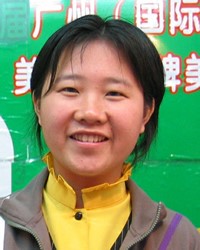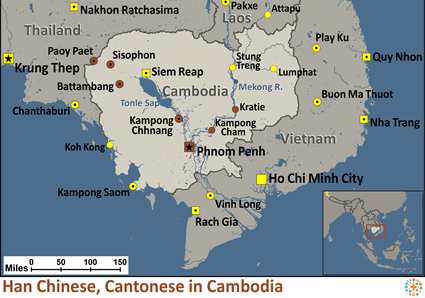Han Chinese, Cantonese in Cambodia

Photo Source:
Karolien Taverniers - Flickr
Creative Commons
|

Map Source:
Location: Web research. Imagery: GMI, ESRI, Maxar, Earthstar Geographics, ESRI User Community. Design: Joshua Project.
|
| People Name: | Han Chinese, Cantonese |
| Country: | Cambodia |
| 10/40 Window: | Yes |
| Population: | 5,000 |
| World Population: | 80,133,700 |
| Primary Language: | Chinese, Yue |
| Primary Religion: | Ethnic Religions |
| Christian Adherents: | 1.00 % |
| Evangelicals: | 0.40 % |
| Scripture: | Complete Bible |
| Ministry Resources: | Yes |
| Jesus Film: | Yes |
| Audio Recordings: | Yes |
| People Cluster: | Chinese |
| Affinity Bloc: | East Asian Peoples |
| Progress Level: |
|
Introduction / History
The Cantonese are a subgroup of the Han Chinese. Cantonese and Mandarin (the language of the Han Chinese) are mutually unintelligible. Although they speak different languages and dialects, all Chinese people in China use the same written script. Cantonese speakers can be read something written by a Mandarin speaker for example.
The large southern Cantonese majority city of Guangzhou has been continually inhabited for 2,200 years. The city has been the center of Cantonese civilization. In the 33rd year of the reign of Emperor Qin Shihuang (214 BC), the Nanhai Prefecture was established in today's Guangzhou. Large numbers of other Han Chinese came into the area. Guangzhou became home to large numbers of foreign merchants in the ninth century until the T'ang emperors lost control of it in AD 878.
Some Cantonese came to live in Cambodia to escape war and to engage in business. Before 1975 tens of thousands of Cantonese speakers lived in Cambodia. Some of them were able to escape the Khmer Rouge and others were killed as undesirable foreigners. The communist Khmer Rouge ruled from 1975 to 1979 and murdered up to a quarter of the population. Today Cambodia is officially a constitutional monarch but is actuality a one-party authoritarian state.
What Are Their Lives Like?
In Cambodia, the Cantonese speak their own language at home and Khmer or Mandarin at work.
Many Cantonese in Cambodia own restaurants and feature a fusion of southern Chinese, French and Cambodian cuisine. Other Cantonese work in the growing tourist trade, in finance or as managers in factories.
Cambodia is classified as a "least developed" nation by the UN, yet it has one of the fastest growing economies in the world. The Chinese are investing billions of dollars through the Belt and Road Initiative. Some of the poorer Cambodians resent the relative wealth and status of the Cantonese Chinese in their country.
The Cantonese of Cambodia strive to maintain their language and distinct culture. They send their children to private Chinese schools. Cantonese parents want their children to obtain a university education and attend colleges in China, Europe or North America. The Cantonese tend to have smaller families than the Khmer majority in Cambodia.
What Are Their Beliefs?
The Cantonese have continued to be one of the most openly religious of all Han Chinese peoples. Most homes have spirit altars. The Cantonese also observe Taoist and Buddhist festivals.
Today there are at least 1.2 million Cantonese Christians in China but only a small number in Cambodia are believers. There are many Christian resources in Cantonese including a complete Bible and the JESUS Film.
What Are Their Needs?
The Cantonese in Cambodia tend to be materialistic in their lifestyle. The Cantonese focus on producing wealth, believing that money will make them happy. The Cantonese must understand that they are sinners in need of a savior. Only the Lord can forgive their sins and grant them eternal life.
Prayer Points
Pray the few believers among the Cantonese of Cambodia can find fellowship and grow in the faith.
Ask the Lord to send workers to the Cantonese of Cambodia and to direct them to persons of peace with whom to share the gospel.
Ask God to place a hunger for truth in the hearts of the Cantonese of Cambodia and to reveal his word to them as truth.
Pray that the Lord would establish a growing, multiplying church among the Cantonese of Cambodia in this decade.